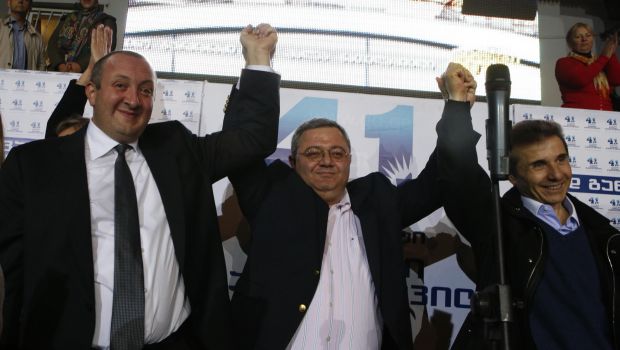
Georgia’s prime minister, Bidzina Ivanishvili, (R), presidential candidate Georgy Margvelashvili (L), and parliament speaker David Usupashvili celebrate Margvelashvili’s victory in Sunday’s presidential election at the Georgian Dream coalition’s headquarters in Tbilisi on October 27, 2013. (REUTERS/Grigory Dukor)
“This clean election . . . tells me that Georgia’s democracy is maturing,” said Joao Soares, head of the observer mission sent by the Organization for Security and Cooperation in Europe (OSCE), Europe’s main security and rights watchdog.
Partial results showed Sunday’s election was won by Georgy Margvelashvili, the candidate representing the ruling Georgian Dream coalition which ousted President Mikheil Saakashvili’s government last year at the polls.
“In a positive and transparent election, the Georgian people have confirmed last year’s historic transfer of power,” Soares declared in a written statement which said fundamental freedoms of expression, movement and assembly were respected.
Saakashvili, who ruled for a decade, was unable to take part in the election because he had already served the maximum two terms. Unlike previous elections in post-Soviet Georgia, the vote was free of major violations or violence.
“These elections are an important achievement for the country and for the entire South Caucasus region,” said Meritxell Mateu Pi, head of a delegation representing the Parliamentary Assembly of the Council of Europe.
Margvelashvili’s triumph concentrates power and will make policy-making easier because Ivanishvili’s Georgian Dream coalition now controls both the presidency and the government for the first time.
But the election is likely to provide only a brief respite from political uncertainty in the country of 4.5 million which is strategically important for both Russia and Europe, which gets Caspian gas and oil via pipelines that go through Georgia.
Margvelashvili is a little-know politician who was picked as a candidate by Ivanishvili. His main foreign policy goal is to pursue close ties with both the West and Russia, a balance that has long eluded Georgia.
Krzysztof Lisek, head of a European Parliament delegation, said the election was an important step for Georgia on its path towards closer ties with the European Union.
The Georgian government hopes to be able to initial an “association agreement”, charting a course for deeper integration with the EU, at a summit in the Lithuanian capital of Vilnius next month.
Lisek said signing the agreement would depend on “tangible progress in the area of rule of law and democracy.”
